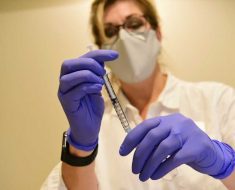NEW YORK (Reuters Health) – Throughout the pandemic, doctors have found that pregnant women who contract COVID-19 may be able to pass the infection to their babies. In a new case study, doctors in Kansas City report that newborns could develop a fetal inflammatory response syndrome associated with the virus.
In this instance, the baby was born prematurely and was in critical condition but recovered, yet doctors should consider how the virus may create an inflammatory response during pregnancy, the authors write in the journal Pediatrics.
“In more than 95% of cases, if the mother gets infected, she does well and the baby does well, too,” said Dr. Vincenzo Berghella of Thomas Jefferson University in Philadelphia. Dr. Berghella, who wasn’t involved with the case report, has researched maternal and newborn outcomes associated with COVID-19 infection during pregnancy.
“In less than 5% of cases of maternal infection, the mother can get very sick and risk consequences to the baby,” he told Reuters Health by email. “It is possible (but rare) for the virus to cross the placenta and infect the baby, and it is also possible, although very rare, for the maternal inflammatory response to affect the baby and cause severe inflammation in the baby, too.”
In the case report, pediatricians at Children’s Mercy Hospital in Kansas City and the University of Kansas Hospital describe a case of fetal inflammatory response syndrome, or FIRS. They declined to comment for this article.
The 32-year-old mother, who went into labor prematurely at 34 weeks, showed up at the hospital with COVID-19 symptoms and tested positive for the virus. She also had severe preeclampsia.
The baby was delivered quickly and required mechanical ventilation. He had a fever, neonatal respiratory distress syndrome and elevated levels of several inflammatory markers. He tested negative for COVID-19 twice, as well as other infectious diseases.
The baby received an antibiotic for seven days and a platelet transfusion for low platelet counts. Ventilation was removed after the fifth day, and he began recovering at the hospital. He was discharged after 22 days with no follow-up required beyond standard prematurity care.
FIRS has been documented in premature births, the authors write, and this case lacked some of the typical abnormalities such as umbilical cord inflammation or placental insufficiency.
However, the high inflammatory levels indicated some vascular damage and multi-organ issues, which the authors attribute to exposure to the mother’s COVID-19 infection during pregnancy. The fetal inflammatory response appeared similar to the hyperinflammatory syndrome seen in children during the pandemic, which has been called multisystem inflammatory syndrome in children, or MIS-C.
The low platelet counts, in particular, could indicate an inflammatory response associated with COVID-19, the authors write. Several blood and platelet abnormalities have been documented in COVID-19 cases and MIS-C.
As the pandemic continues, doctors should monitor platelet counts in newborns with inflammation, the authors suggest, especially if they may have been exposed to COVID-19. In this case, platelet counts stabilized after a transfusion.
A limitation of the case report is that the lab tests didn’t look for the presence of the virus in the amniotic fluid, cord blood or placental tissue, the authors write, which could clarify whether the virus passed from the mother to the baby. In addition, they didn’t check for interleukin levels in the amniotic fluid or the fetal plasma, which could have provided additional indicators to confirm a diagnosis of FIRS.
“Recent publications have shown that, in a small number of infected pregnant women, the coronavirus can infect the fetus’ placenta in the womb,” said Dr. David Schwartz of the Medical College of Georgia in Augusta, Georgia. Dr. Schwartz, who wasn’t involved with this case report, has researched how COVID-19 is affecting pregnant women and newborns.
“Vaccinating pregnant women or those planning a pregnancy may not only prevent maternal infection but also decrease the likelihood of potential mother-to-fetus transmission of the coronavirus,” he told Reuters Health by email.
SOURCE: https://bit.ly/2Qd8nvQ Pediatrics, online March 19, 2021.
Source: Read Full Article





